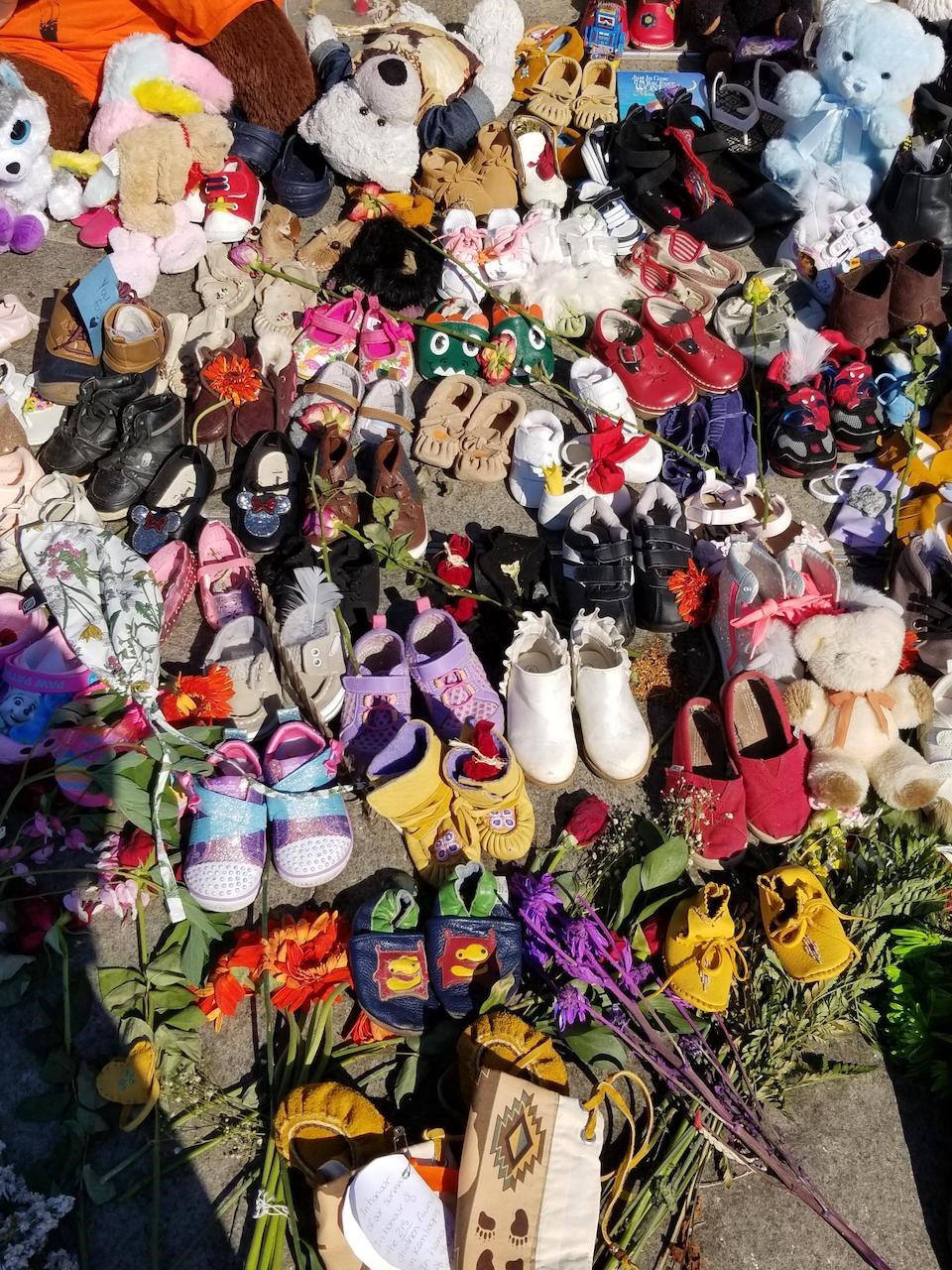It seems our country is finally ready to have the difficult conversation. To set aside our fantasy version of who we are. Like many others, the discovery of the unmarked graves of 215 children on the site of the Kamloops (Tk’emlups) residential school left me sad and angry.
When my daughter was five years old, I used to accompany her on the 10-minute walk, across a busy street, to the bus that took her to kindergarten. I would meet her off the bus a few hours later. One day, she wasn’t on the bus. The bus driver looked as worried as I felt. I ran home and called the school. She wasn’t there. My story has a happy ending. But if you magnify a thousand times the fear and guilt I experienced, you will begin to taste what it was like for many Indigenous parents who went to the residential school to get their children and were told they weren’t there.
The federal government has known about the horrors of residential schools since 1907 when Dr. Peter Bryce, a medical health officer reported to the Department of Indian Affairs, calling the schools “a breeding ground for illness.” He was shocked by the overcrowding, poor nutrition, hard physical labour, the numerous deaths, and healthy children sleeping next to children with tuberculosis. He was given the boot. Why? Because the Indian Act was designed to dispossess Indigenous people of their lands, in order to facilitate the exploitation of their forests, waters and mountains. The fewer Indigenous people, the easier to accomplish this colonial quest. Dr. Bryce later published his findings in the 1920s in the pamphlet, “A National Crime.”
Four years ago, I began a reconciliation initiative on the island with the support of the Bowen Island Arts Council and the Bowen Island Library. The purpose of “Knowing Our Place” was to educate ourselves about our true history with Indigenous People, and to work toward respectful, mutually enhancing relationship. Things slowed down a bit because of the pandemic, although we did celebrate last June 21st with Squamish Nation Elders, the blessing of the sign with the Squamish Nation name for the island, Nexwlélexwm.
I won’t diminish the importance of our events, workshops and the book club; but they were baby steps. It’s time to grow up and take some big steps. Reconciliation needs to include putting back what was taken away and there was plenty taken away. Language, culture, rights, governance, health, land, education, and most egregiously, the children.
What can we do?
Educate ourselves. If you have a strong stomach, read the TRC - Truth and Reconciliation Commission Report, 2015. The commission was funded by the residential school survivors, using one third of their financial settlement. It took me months to get through the report – five pages a day – the tears kept getting in the way. An entire chapter talks about missing children and unmarked graves. Read the 94 Calls to Action. After six years, only eight of these Calls to Action have been addressed. Read books by Indigenous authors; the library has a list. Or ask me for one.
Watch the NFB Film “We Were Children.” Go to aptn.ca - Aboriginal Peoples Television Network – and see the world through their eyes. Go to the Reconciliation Canada Facebook Page and watch the videos which were recorded a few days ago with Chief Robert Joseph, his daughters, Karen and Shelley, and guests. These videos helped me channel my anger and grief: facebook.com/pg/ReconciliationCanada/videos/?ref=page_internal.
Listen to CBC Radio Cross Country Check Up, recorded June 6: cbc.ca/radio/checkup/what-conversations-are-you-having-with-family-and-friends-about-the-kamloops-grave-discovery-1.6054089.
Make a donation: Indian Reservation School Survivors Society: irsss.ca/donate.
First Nations Child and Family Caring Society: fncaringsociety.com/donate.
Contact Patrick Weiler, our Member of Parliament: 604-913-2660; [email protected]. Thank him for voting yes to Jagmeet Singh’s non-binding motion to drop a pair of court fights involving First Nations children. Tell him you want the federal government to stop spending your tax dollars in this way. Tell him you want the government to fund investigations on all residential school sites for unmarked graves, and to allow each nation to take charge of the proceedings. These children need to be returned to their homes for proper burial. Tell him you want the same quality of water, housing and education for Indigenous people.
Demand of all levels of government (including our municipal government) that they implement UNDRIP - the United Nations Declaration on the Rights of Indigenous Peoples – adopted in 2007 – and the Calls to Action of the TRC.
If you are a member of a church that ran these schools, pressure them to release records of the children so they can be identified.
Reconciliation is a long, ongoing process. It’s messy and uncomfortable. We are bound to make mistakes, but we must keep going. It’s up to us to acknowledge our dark history and our dark present so the future will be brighter for everyone.
May the words of Chief Robert Joseph, hereditary chief of the Gwawaenuk First Nation, motivate you as they have motivated me: “Little ones, we see you, we feel you.” You have “triggered us to think differently about who we are as Canadians, as human beings.” You “will help to transform this country.” You “are giving us an opportunity to change.”
For immediate assistance to those who may need it, the National Indian Residential School Crisis Line is available 24 hours a day at 1-866-925-4419.



